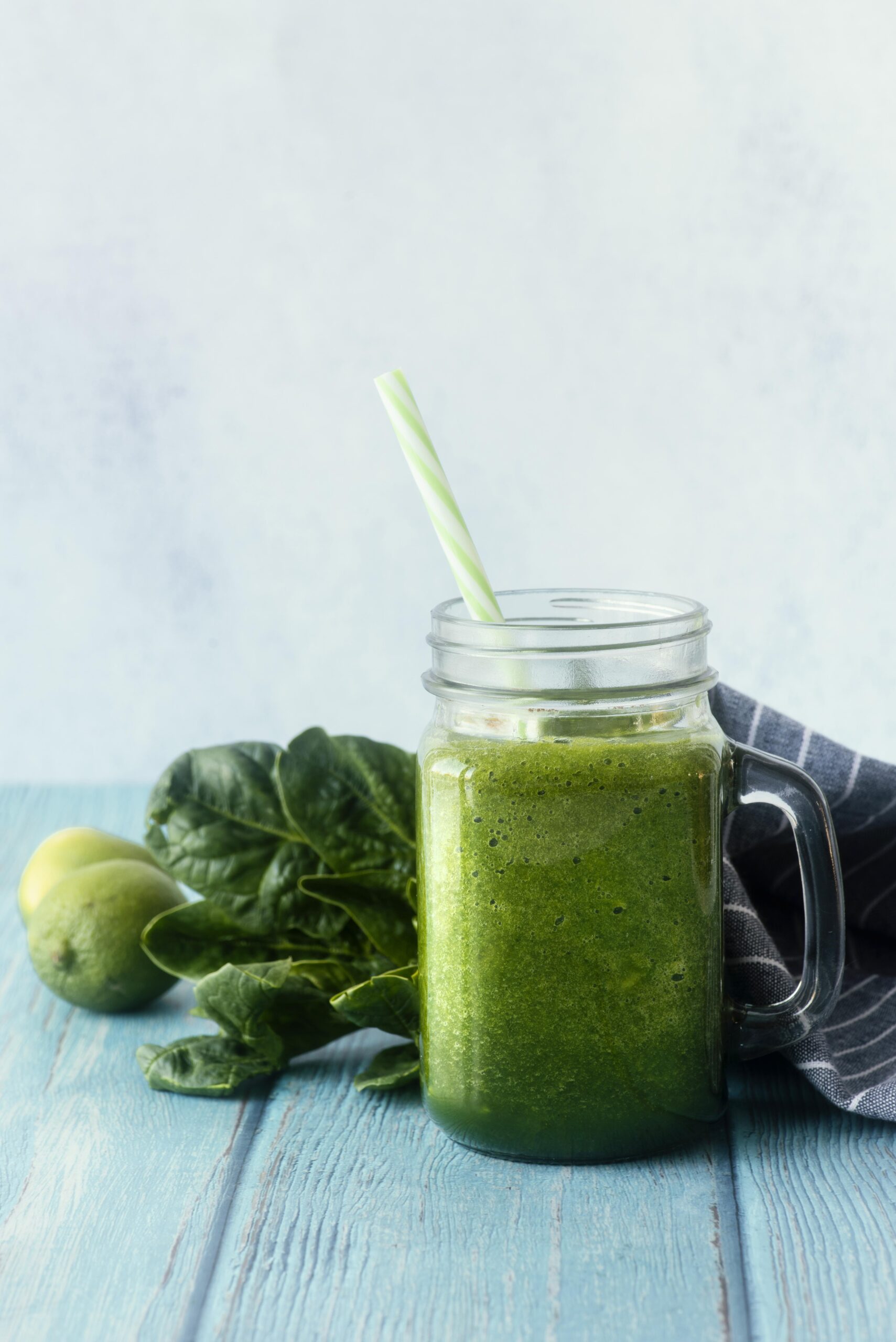If you often wake up bloated, foggy, or running on empty, you’re not alone—and the fix might be greener than you think.
These aren’t sugar-loaded juice bar blends. These are functional green smoothies crafted for women managing fatigue, gut issues, inflammation, PCOS, or hormonal swings. They’re nutrient-dense, anti-inflammatory, fiber-rich – perfect for sensitive digestive systems.
Let’s explore three of my go-to recipes, including the one I drink on repeat.
🌿 Why Green Smoothies Are So Powerful
Green smoothies keep the fiber—unlike juices—making them a gentle, healing choice for:
-
Gut support through prebiotics, enzymes & hydration
-
Inflammation reduction via phytonutrients
-
Sustained energy without a crash
-
Hormone detox & support from fiber, fats, and minerals
1. Gut-Healing Green Smoothie
✅ Low-FODMAP Verified by Monash University
Perfect for: IBS, SIBO, bloating, or general gut discomfort
Benefits:
-
Calms inflammation
-
Supports digestion & liver detox
-
Gentle on sensitive stomachs
Ingredients:
-
½ cup frozen pineapple (Monash-verified low-FODMAP up to 1 cup)
-
½ small green banana (unripe banana: low-FODMAP in 1/3 banana servings)
-
1 handful baby spinach (low-FODMAP in 1½ cup raw)
-
1 tbsp chia seeds
-
1 tbsp collagen peptides (dairy- and gluten-free)
-
1 cup unsweetened almond milk (check ingredients: should be <2% almonds)
-
Optional: ½ tsp grated ginger (Monash-verified <1 tsp per serve)
🕒 When to drink: Mid-morning or post-breakfast
📌 Why it works: Spinach and chia support gut motility and fiber. Pineapple contains bromelain, a digestive enzyme shown to reduce inflammation. Keep in mind that chia seeds may not be well-tolerated by everyone and can cause digestive discomfort in some individuals, especially those with sensitive guts.
2. Hormone-Balancing Green Smoothie
☁️ Great for PCOS, PMS, or post-pill hormone recovery
Benefits:
-
Supports natural hormone detox
-
Balances blood sugar and mood
-
Seeds support estrogen and progesterone
Ingredients:
-
1 cup kale or spinach
-
1 small green apple (low-FODMAP in ½ apple portions)
-
1 tbsp ground flaxseed (ideal during follicular phase)
-
1 tbsp almond butter
-
½ avocado (low-FODMAP up to ⅛ avocado per serve)
-
1 cup almond milk or water
🕒 When to drink: Morning or late afternoon snack
📌 Why it works: Flax helps with estrogen metabolism. Avocado and nuts add healthy fats for hormone production.
3. Energy-Boosting Detox Green Smoothie
🌟 My personal favorite
Perfect for: Sluggish mornings, brain fog, immune support
Benefits:
-
Energizes mitochondria
-
Replenishes electrolytes
-
Rich in antioxidants
Ingredients:
-
½ cucumber (Monash-verified low-FODMAP)
-
1 stalk celery (1 stick = low-FODMAP)
-
1 handful spinach
-
Juice of ½ lemon
-
½ green apple (low-FODMAP in ½ apple portions)
-
1 tsp fresh ginger
-
1 scoop clean plant-based protein (pea or brown rice)
-
1 cup coconut water (check for no added FODMAPs)
🕒 When to drink: Pre-workout or after a poor night’s sleep
📌 Why I love it: Coconut water hydrates, greens alkalize, and the ginger–lemon combo wakes up digestion and the brain.
How to Add These Smoothies to Your Routine
-
Rotate them weekly or based on symptoms (bloat, fatigue, cycle)
-
Freeze pre-measured ingredients in zip bags
-
Add magnesium or sea salt if your minerals are low
-
Always pair with protein for blood sugar stability
💬 Final Words
A green smoothie won’t cure everything—but when designed intentionally, it can absolutely nourish your gut, calm inflammation, balance hormones, and boost your energy.
Start with one that fits your current goal. Drink it regularly. Listen to your body. And tweak ingredients based on your cycle or digestive needs.
References:
-
Monash University FODMAP Diet App – Verified low-FODMAP food quantities, including limits for pineapple, spinach, unripe banana, celery, cucumber, avocado, and green apple
🔗 https://www.monashfodmap.com/i-have-ibs/ -
Bromelain (pineapple enzyme) and anti-inflammatory effects
🔗 https://www.ncbi.nlm.nih.gov/pmc/articles/PMC3529416/
** This article is for educational purposes only and does not constitute medical advice. Always consult with a qualified healthcare provider or registered dietitian before making changes to your diet, supplements, or wellness routine—especially if you have a diagnosed medical condition such as IBS, SIBO, PCOS, or an autoimmune disorder.
